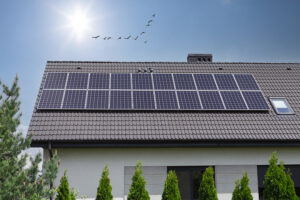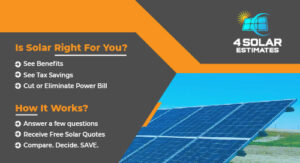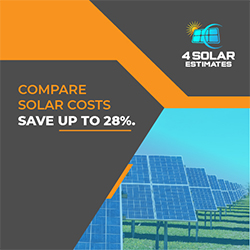
How Many Solar Panels Does the Average Home Need?
If you plan to invest in solar panels it is vital to understand how many panels you will need. The average residential home in the United States requires between 16-24 solar panels to generate enough energy for its needs. However, this number can vary depending on your home’s size and location, as well as the type of solar panel system you choose.
COMPARE SOLAR QUOTESWhat are Solar Panels?
Before deciding how many solar panels your home needs, it is vital to first understand how solar panel systems work.
- Solar panels are photovoltaic (PV) cells that capture and convert the sun’s energy into electricity.
- Solar panels are typically made up of semiconductor materials such as silicon, with the cells connected together to form a panel.
- When sunlight hits the solar cell, electrons are knocked loose from their atoms in the solar cell material and collected to generate an electric current.
How Much Energy Do Solar Panels Generate?
Installing solar panels is an excellent way to reduce your energy costs and become more environmentally friendly. By understanding what size system you need for your home, how many panels are required, and the incentives available in your area, you can make an informed decision about whether or not solar is right for you.
- The average home needs about 5 kilowatts (kW) of solar panels to offset most of its energy use. This averages to about 16-20 solar panels.
- The exact number of panels you will need depends on several factors, such as the amount of energy your household uses and the size and orientation of your roof. However, you can use the average 5 kW system as a baseline to estimate how many solar panels are needed for an average-sized home in your area.
- A 5 kW solar panel system typically consists of 20 photovoltaic panels and can produce enough electricity to power an average-sized home. It will also generate about 7,000 kilowatt-hours (kWh) of electricity per year, which is equivalent to offsetting much of the energy consumption from a typical residential customer in the US.

What Factors Affect How Many Solar Panels You Need?
The number of solar panels needed for an average-sized home may vary depending on a number of factors, including local climate, roof size and orientation, and electricity usage. It’s important to consult with a local solar installer to determine the exact number of panels for your home.
Climate and Roof Size
- Your local climate and roof size can affect the efficiency of your solar panel system.
- For example, in areas with low levels of sunlight or heavy cloud cover, you may need more panels to generate enough energy to power your home.
- Additionally, if your roof is larger than average, you may need more panels to absorb the necessary amount of solar energy.
Electricity Usage
- Your household’s electricity usage can also affect how many solar panels you need.
- If your home uses more electricity than average, then you will need a larger system to offset the additional energy use.
- On the other hand, if your home consumes less energy than average, then you will likely need fewer panels.
Solar Panel Type
- The amount of energy generated by a single solar panel depends on the type of system you select and its wattage rating.
- For example, a top-of-the-line monocrystalline solar panel with a 400W power output will generate more energy than two lower-grade polycrystalline panels with 300W power ratings.

How Do Solar Panels Compare to Traditional Electricity?
Solar panels are an increasingly popular way to reduce electricity costs and become more environmentally friendly. When compared to traditional electricity, they offer several advantages.
- Firstly, solar panels require no fuel and generate no emissions, making them a clean energy source that is safe for the environment.
- Secondly, they can be used to produce electricity without relying on an external power source, offering potential cost savings.
- Finally, solar panels are relatively easy to install and maintain and can last for up to 25 years, making them a more reliable long-term option than traditional electricity sources.
In conclusion, solar panels are an excellent way to reduce your energy costs and protect the environment.
COMPARE SOLAR QUOTESCan You Use Partial Solar Energy to Reduce Solar Panels Needed?
Yes, it is possible to use partial solar energy to reduce the number of solar panels needed for your home. This can be done by using a combination of traditional electricity sources and solar energy.
- When opting for partial solar, homeowners must first calculate their home’s average electricity usage in order to determine the size of their system.
- Once the size of their system is determined, they can purchase fewer solar panels, while still achieving a reduction in energy costs due to the combination of traditional electricity sources and solar energy.
- In this way, homeowners may be able to reduce the number of solar panels needed for their home, without sacrificing any of the benefits associated with switching to solar energy.
- By understanding the factors that affect how many solar panels you need and exploring partial solar energy options, you can make sure that your home is equipped with the right system for your needs.
- Additionally, when switching to solar, be sure to research any incentives offered by your state or local government, as they can help reduce the cost of your solar panel system.
With careful planning and research, it is possible to make the switch to solar energy without breaking the bank.

How Much Do Solar Panels Cost Per Panel?
The cost of solar panel systems can vary significantly depending on the size, type, and installation costs of the system.
- Generally speaking, a 5 kW solar panel system can range from $15,000 to $23,000 before incentives and rebates.
- This means that the cost per panel could be anywhere from around $750 to $1,200 per panel.
- The cost of solar panels has dropped significantly in recent years, making them an increasingly attractive option for homeowners looking to reduce their energy bills.
- Additionally, incentives and rebates from local and federal governments can help offset the cost of installing a solar panel system.
Ultimately, the number of panels you need will depend on the size and efficiency of your home’s solar system, as well as the type of solar panel system you choose. To determine precisely how many panels you need, contact a certified installer who can provide an accurate assessment.
COMPARE SOLAR QUOTES
Leave a Reply